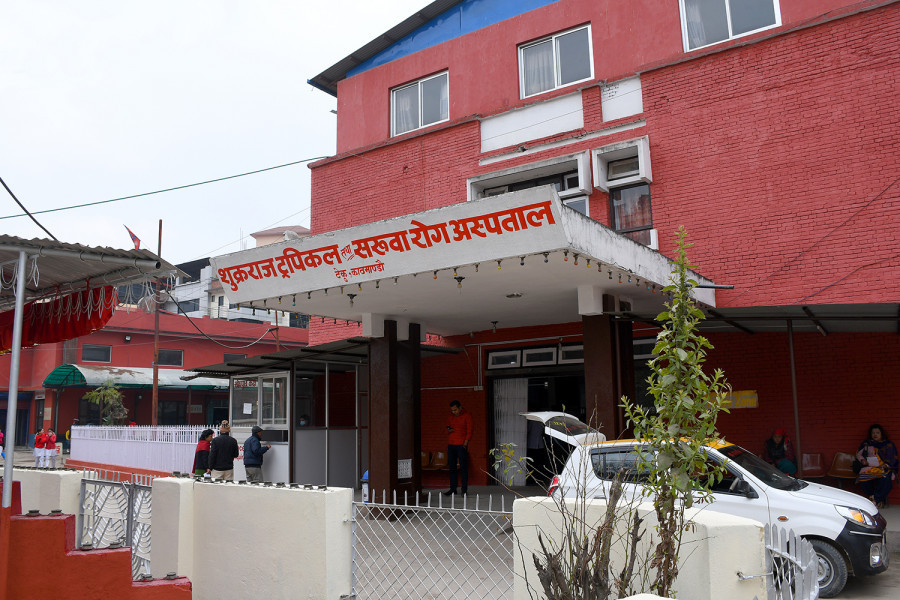Valley
As Covid-19 cases rise in Valley, people fear to visit Teku hospital for anti-rabies vaccine
On an average, 30 people visited the hospital daily during the four months of lockdown. After the restrictions were eased, the number has reached 50.
Anup Ojha
Fifty-year-old Chandra Thakur, who used to run a barber shop in Kalanki, had to shut shop after the ward-14 of Kathmandu Metropolitan City sealed the area on Thursday when 44 cases of Covid-19 were found.
In the evening, he went to his friend's rented room in Soalteemode to borrow some money. But while returning home, he was bitten by a stray dog at Kalanki Chowk on his right calf. It was 8pm.
The incident put Thakur in a catch-22 situation. He needed to go to Sukraraj Tropical and Infectious Disease Hospital at Teku for an anti-rabies vaccine. But the hospital has also been treating Covid-19 patients since the two cases were reported in Nepal, the first in January and the second in March.
“All my friends were afraid to take me to hospital,” Thakur, who is from Kailali district and has no family in Kathmandu, said. “I needed someone to go with me and finally a relative agreed.”
Having taken the first dose of anti-rabies vaccine, Thakur is confident that he will not have to suffer from rabies. He still needs to have an additional two doses on Monday and Friday. However, going to the Teku hospital has scared both Thakur and his relative Sham Thakur, 43, who gave company to him, that they may have become infected with the coronavirus.
As the number of Covid-19 cases rises in Kathmandu, people who are bitten by dogs are afraid of going to Sukraraj Hospital in Teku. Every day 1,000 people go to the hospital for virus testing but only 300 get tested, according to Khil Nath Gautam, medical health supervisor at the hospital.
Gautam said on average 50 people come to the hospital for anti-rabies shots after being bitten by stray dogs. It is the only hospital in Kathmandu Valley which gives anti-rabies shots for free.
“Every day even we have some kind of fear of transmission of disease when we enter the hospital gate for work,” said Gautam.
At present, 45 people with Covid-19 are undergoing treatment at the hospital. From January to till July 15, a total of 89 Covid-19 patients have returned home after treatment.
As of Sunday, 1,966 cases of Covid-19 were reported in Kathmandu Valley, of which 1,566 cases were reported in Kathmandu, 267 in Lalitpur and 133 in Bhaktapur district.
According to the hospital, during the nationwide lockdown that started from March 24 and lasted till July 21, a total of 3,534 people visited the hospital for anti-rabies vaccine, an average of 29 persons a day.
“People found it risky to come here,” said Dr Sher Bahadur Pun, the hospital’s clinical research coordinator.
He said the number of people coming to visit the hospital was comparatively lower during the lockdown as people were not allowed to walk on the streets. “So there was a smaller chance of dog bite,” said Pun.
Like Thakur, Bakhat Bahadur Tamang, 42, a resident of Jadibuti, a truck driver by profession, got a dog bite on his left thigh at 9 pm last Sunday after he came out of his room to get some fresh air.
“He came bleeding to the room,” said his wife Dali Tamang, 32, a mother of two sons, who is originally from Sindhupalchok. “I made him wash the wound with soap water and put a bandage on his wound. The next day I took him to Teku Hospital. There was a long queue of people who had come for the coronavirus test. We both are still living in fear after going there even though we were wearing masks.”
In 2018, the Kathmandu Metropolitan City estimated that Kathmandu’s street dog population was around 30,000. Since then there has been no fresh estimate but municipal spokesperson Ishwor Man Dangol believes that the number could be slightly higher now.
According to medical health supervisor Gautam, no rabies death was recorded in 2019 and so far in 2020. In 2018, there were eight deaths.
Hospital records show that at least 17 people died in 2017 and 16 people lost lives in 2016 after getting bitten by rabid dogs.
The hospital’s anti-rabies shots services are open from 9am to 1:30pm, and there is a separate line for visitors. Before Covid-19 cases were diagnosed in Nepal, the hospital used to provide the service around the clock.
“We even got patients at night and gave them the vaccine,” said Rup Narayan Khatiwada, section officer at the hospital. “On an average, 30 people used to visit the hospital in the night. Now the hospital has closed that service because of Covid-19.”
However, there still are people visiting the hospital for anti-rabies vaccine despite the fear of catching the coronavirus.
“I have heard that there is no chance of survival after the rabies virus is seen in the body, but now there is great fear of being infected with the Covid virus,” said Thakur. Therefore, he is confined to his single rented room with his wounded leg.
“I closed my shop for four months. It’s hard for me to heal the financial burden, and now I got a dog bite, and there is fear of Covid-19,” said Thakur. “My life is full of fear, and I am living with it.”




 9.83°C Kathmandu
9.83°C Kathmandu.jpg)














